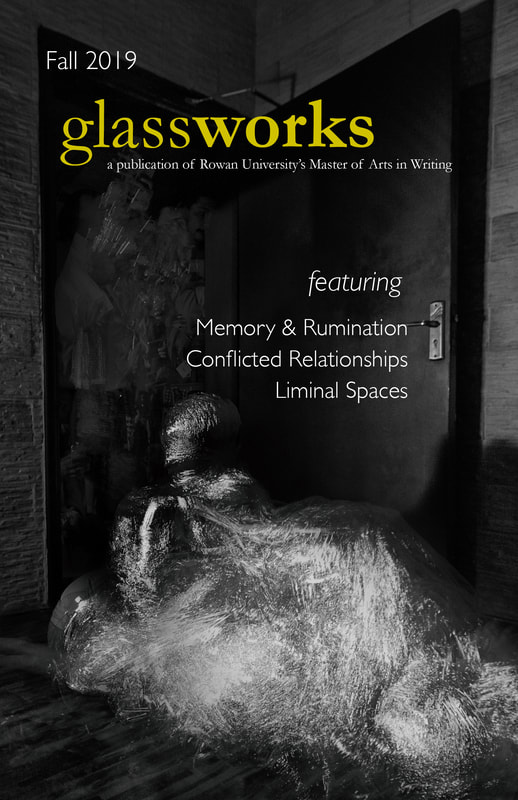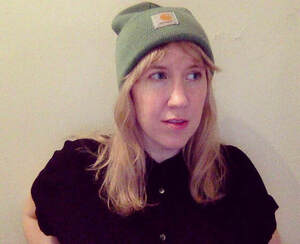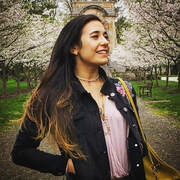|
lookingglass
Through the "Looking Glass," readers are invited to dig deeper into our issues as contributors share reflections on their work. Specifically, "Looking Glass" provides a sort of parlor where authors and artists reveal the genesis of their pieces, as well as provide meta-discursive insight into their textual and visual creative works. Issue 19 Reflections
Read on for reflections by select authors and artists
on the genesis and craft of their pieces in Glassworks and then read the full issue online! |
Jessica Mehta
"Dear Sylvia (You're Such a Gas)" | "Economics of the Heart"
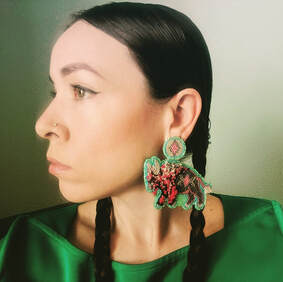
"Dear Sylvia (You’re Such a Gas)" is more reflective of my being deep in Plath-related doctoral research rather than any personal, internal struggles with suicidal thoughts. However, some of the reactions I’ve experienced after the publication of this poem serve as a reminder of how important it is to separate the poet from the poem (even when there seem to be “obvious” connections or if the poet has a history of autobiographical or “confessional” poetry).
Plath’s writings were some of the first where I felt that I was not alone, that there had been someone else in the world who “got it,” and as such Plath nuzzled her way into my heard at a very young age. My deeply seated love and respect for her work likely adds to the seemingly “personal” facets of my own writing, but at the root poetry is, well, poetry. We must consider it with some degree of separation in order to sustain its creative integrity. (That being said, I totally had to look up mid-century cleaning product names)
Plath’s writings were some of the first where I felt that I was not alone, that there had been someone else in the world who “got it,” and as such Plath nuzzled her way into my heard at a very young age. My deeply seated love and respect for her work likely adds to the seemingly “personal” facets of my own writing, but at the root poetry is, well, poetry. We must consider it with some degree of separation in order to sustain its creative integrity. (That being said, I totally had to look up mid-century cleaning product names)
Alyce Miller
|
Kimberly Lambright
|
Jessica deKoninck
"Good Humor"

The jumping off point for this poem was lunch with my mother, the “now” in this poem of then and now. She struggles with dementia which impacts her diet as well as her memory. It’s a childlike diet. I can’t remember the last time she considered touching a vegetable. But when she refuses to eat anything else, she will agree to a milkshake or ice cream.
Ice cream, as I think about it, seems a natural metaphor for the passage of time. It connects the “then” and the “now.” It melts. It’s evanescent. But it’s also smooth and sweet and readily evokes memories.
The poem begins with an early childhood summer memory of playing on the front lawn of the apartment building in Brooklyn, New York, where we then lived. I watched a lot of television, or the television I did watch really stuck with me. I vividly remember the commercials for Good Humor ice cream and the jingle that still runs in my head. The poem’s title has the benefit of being both literal in meaning and a brand name.
Finally, the poem reflects on the shifting roles of parent and child in the provision of sustenance through a meditation on money. In the past the child relied on the mother to provide money for ice cream. In the present, the child is responsible for the bill. The parent can no longer do simple arithmetic. The poem ends on forgetting, but in larger scope, it is a poem about remembering.
Ice cream, as I think about it, seems a natural metaphor for the passage of time. It connects the “then” and the “now.” It melts. It’s evanescent. But it’s also smooth and sweet and readily evokes memories.
The poem begins with an early childhood summer memory of playing on the front lawn of the apartment building in Brooklyn, New York, where we then lived. I watched a lot of television, or the television I did watch really stuck with me. I vividly remember the commercials for Good Humor ice cream and the jingle that still runs in my head. The poem’s title has the benefit of being both literal in meaning and a brand name.
Finally, the poem reflects on the shifting roles of parent and child in the provision of sustenance through a meditation on money. In the past the child relied on the mother to provide money for ice cream. In the present, the child is responsible for the bill. The parent can no longer do simple arithmetic. The poem ends on forgetting, but in larger scope, it is a poem about remembering.
Pernille AEgidius Dake
"Preservation"
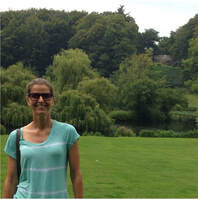
For the initial rewrites of “Preservation” the first line read: “If looks could kill, I’d be six feet under.” As hackneyed as the sentence was the sentiment had felt true when, from across the room, a woman with whom I was acquainted had stared venomously at me as I spoke with her husband at his place of employment, where I was a client. I felt extremely uncomfortable for giving in to her hatred. Worse was the fact she took me for a cheat. “Sister,” I wanted to say, “You’ve got me all wrong.” But there’s no affinity to be found in someone riddled with misconstrued anger. So I tried to write away my woes while remaining ‘all smiles’ towards the hateful woman because, at the time, I thought I wanted to be friends.
My composition explored the wrong done to my person in depth, pushed more and more sympathetic angles into my POV and pictured her person increasingly obnoxious. The loathing was explored just fine, but felt unmanageable and stuck. As a CNF piece it was all wallow and no stakes, no plot. In other words, the story sucked.
Eventually, I was fed up enough I needed to turn everything on its end, go fictional: I considered feeling what she felt, understanding her hate... Keeping in mind, understanding doesn’t equal acceptance. When I let go of the personal stranglehold, the freedom to write appeared limitless. The misread began to feel as important as the hostility, and out of the concept of the unreal came the two protagonists who both created alternate realities—photography and taxidermy. Neither careers I, at the onset, knew much about, which made it easier to let completely go of all what really happened, and the writing became fun. Still arduous, but fun. The animosity suddenly lay open to be explored from more, hitherto unrealized sides, and the story could spin out of control and run its absurd course.
My composition explored the wrong done to my person in depth, pushed more and more sympathetic angles into my POV and pictured her person increasingly obnoxious. The loathing was explored just fine, but felt unmanageable and stuck. As a CNF piece it was all wallow and no stakes, no plot. In other words, the story sucked.
Eventually, I was fed up enough I needed to turn everything on its end, go fictional: I considered feeling what she felt, understanding her hate... Keeping in mind, understanding doesn’t equal acceptance. When I let go of the personal stranglehold, the freedom to write appeared limitless. The misread began to feel as important as the hostility, and out of the concept of the unreal came the two protagonists who both created alternate realities—photography and taxidermy. Neither careers I, at the onset, knew much about, which made it easier to let completely go of all what really happened, and the writing became fun. Still arduous, but fun. The animosity suddenly lay open to be explored from more, hitherto unrealized sides, and the story could spin out of control and run its absurd course.

